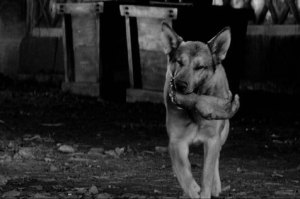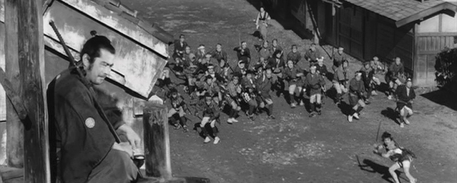I’ve heard Yojimbo described as Japanese nihilism and that’s true up to a point. Morally speaking, there are no uplifting lessons here; it’s dog-eat-dog in Akira Kurosawa’s pioneering noir Western. The story revolves around an impoverished samurai, Sanjuro, who stumbles into a village terrorized by warring criminal gangs. Once admired for their warrior skills and aristocratic code of honor, the samurai had become swords-for-hire following the Western penetration of Japan in the mid-nineteenth century.
The story revolves around an impoverished samurai, Sanjuro, who stumbles into a village terrorized by warring criminal gangs. Once admired for their warrior skills and aristocratic code of honor, the samurai had become swords-for-hire following the Western penetration of Japan in the mid-nineteenth century.
Sanjuro sells himself to the highest bidder, and has no qualms about double-crossing his employers. He appears unscrupulous, a casual killer who sponges off his hosts, lies and cheats, loyal to nobody. And yet he grows on us. Well before Sanjuro reveals his compassionate side, I found myself rooting for him.
For one thing, the bad guys were so much worse than he was, and let’s face it, the village was a mess. Who could blame him for wanting to get the heck out of there? Gary Cooper, Alan Ladd, John Wayne, Jimmy Stewart, Henry Fonda: I don’t care who you pick, nobody could have cleaned up that town.
Kurosawa was a fan of Russian literature. Ten years before he made Yojimbo, he adapted a Dostoevsky novel for the screen. The Idiot was his least successful project, but it was important to him, and very personal, a bleak commentary on postwar Japanese society.
Yojimbo covers the same  territory, but it turns out to be less bleak in the end. The hero of The Idiot is too pure, too fragile, for the corrupt world in which he finds himself. Sanjuro, on the other hand, is well-suited for the modern era. In the Darwinian struggle for survival that characterized the evolution of the Western genre, his type would be selected for.
territory, but it turns out to be less bleak in the end. The hero of The Idiot is too pure, too fragile, for the corrupt world in which he finds himself. Sanjuro, on the other hand, is well-suited for the modern era. In the Darwinian struggle for survival that characterized the evolution of the Western genre, his type would be selected for.


Lisa,
Fundamentally, by definition does not “western” refer to the mythic struggle between “good” and “bad” in the settlement and taming of the geographical portion of the continental United States west of the Mississippi River?
Consequently, how can what Kurosawa produced–“Yojimbo”–be considered a western?
(By the way, I have seen–and enjoyed–“The Magnificent Seven” many times. It’s based on a Kurosawa samurai movie. B-U-T….”The Magnificent Seven” illustrates in compelling fashion the stereotypical “good” triumphing over “bad” scenario, in that far west geographical setting.)
CC
LikeLike
I think the Western genre is broader than your definition suggests, Camilla. There’s far more going on in The Searchers, for example, than a mythic struggle between good and bad; there’s a psychological dimension to that film, and social commentary (and to The Man who Shot Liberty Valence) — both of which influenced Kurosawa, by the way.
The form evolved over time. Look at McCabe and Mrs. Miller. Or Unforgiven. I’m saying that Yojimbo was a necessary step along the way.
LikeLike
Food for thought in this discussion. What IS a reasonable description of a “Western film”? I’ll take a stab at it, throwing some things I’m unsure about. As a genre of film, it arose in the US, derived from 19th-century works of popular or pulp fiction, but its variants have been made in other countries and have taken place in other places and times. A Western usually (always?) takes place away from the centers of civilization, often takes place in a border zone between populated spaces and tracts of nature, and frequently depends on issues of social, political, or moral order. That’s probably missing something—precision if nothing else—but it allows for Japanese films such as Yojimbo as well as Italian films that take place God knows where (Sergio Leone’s films were, if I recall, typically shot in Spain). It even allows for space Westerns, of which the single-season TV series Firefly is a good example.
That said…I haven’t seen Yojimbo, but it sounds worthy. Thanks for another film adventure, Lisa!
LikeLike
I think the classic Western fit within the parameters that Camilla laid out, but these were stretched by directors like John Ford after the war, undermined by Kurosawa, parodied by the French (Dynamite Jack) and Italians, and subsequently reinterpreted by Vietnam-era American directors to criticize the very values that were once ennobled: individualism, frontier justice.
All of these variations and reinterpretations breathed new life into the genre, enlarging it and making it pertinent to the current era. It remains (as one of the Italian Spaghetti Western directors said) a superb container for moral and political messages.
LikeLike
Lisa and John,
While pondering ideas raised in this discussion, I’ve paid particular attention to the use of the words “evolve” and “metamorphosis.” As I see it, Kurosawa, Leone and others produced non-western westerns. They may have started out, thinking they were creating a variation on a theme, but they ended up creating an entirely new type of movie (and one that does not appeal to me at all).
The classic western (which I love dearly) plays/played a very important role in the socialization process of the United States. In fact, its emphasis on such values as fairness, justice, the rule of law, etc. has served over the years to attract also people born outside of the United States. Further, that classic western has sensitized them to the importance of those values in fostering the growth of civil society (something we see sorely needed in such places as Ukraine, Iraq, Afghanistan, and even Russia in today’s world).
Certainly, Kurosawa, Leone and company were free to criticize the classic form. However, was their sole purpose only to criticize or tear down? Did they offer something of value in its place? If so, what exactly?
CC
LikeLike
The case could be made–has been made, in fact–that Kurosawa employed Western conventions to make a crime film (the story of Yojimbo derives from Dashiell Hammett’s novel, Red Harvest). Leone then transposed it into the west in Fistful of Dollars, the first picture of the “Man With No Name” trilogy. In doing so, he changed the genre. I don’t have a problem with this. Pauline Kael said the Western was pretty much dead until Yojimbo came along:
“Yojimbo is not a film that needs much critical analysis; its boisterous power and good spirits are right there on the surface. Lechery, avarice, cowardice, animality, are rendered by fire; they become joy in life, in even the lowest forms of human life. (Kurosawa’s grotesque variants of the John Ford stock company include a giant—a bit mentally retarded, perhaps.) The whimpering, maimed and cringing are so vivid they seem joyful; what in life might be pathetic, loathsome, offensive is made comic and beautiful. Kurosawa makes us accept even the most brutish of his creatures as more alive than the man who doesn’t yield to temptation. There is so much displacement that we don’t have time or inclination to ask why we are enjoying the action; we respond kinesthetically.”
Were Leone’s films good Westerns? That’s a matter of taste. But I don’t think anyone would deny that they influenced subsequent Westerns, including such modern “classics” as Clint Eastwood’s Outlaw Josey Wales and Unforgiven.
LikeLike
Though it doesn’t directly answer Camilla’s questions in the final paragraph of her latest comment, I think it’s important to consider changing attitudes in the society within which Westerns are made. It’s a complicated matter, but a simple way of getting at it is to look at those values of “fairness, justice, [and] the rule of law” that you mentioned and ask “for whom?” Yes, I’m thinking of Native Americans. It’s not so easy to think of taming the land once you realize that it was fine the way it was for the cultures already living on it. It’s not so easy to speak of fairness and the other things—at least not without a sense of irony—when you consider relocations and broken treaties. For that matter, setting aside the Native Americans, it’s not even easy to settle the conflict between cattle ranchers and sheep herders, where the former wanted fences and the latter did not (although that’s a little off my main point). For a long time, it was possible for white Americans to look at their stories of the West as THE stories and to make those into the story of the country, but eventually filmmakers and the public realized there was more than one way to write history. Whether in the past or in the present time, fairness and justice and law are complicated matters; history itself is a complicated thing. The classic Western was bound to change as people became more aware of those issues.
I would rather have studied the matter before writing, but that could’ve taken a long time.
LikeLike
Thanks. Pleased to have discovered your fascinating blog. Lots to explore. Regards from Thom at the immortal jukebox (drop a nickel!)
LikeLike
You’re welcome, Thom. Part of the joy of keeping a blog is making new friends and sharing our passions. I’ll enjoy sampling your music — Iris Dement is already a favorite.
LikeLiked by 1 person